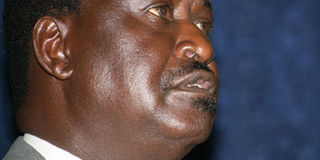Kenyans united in opposing bid to gag the Press

Former Prime Minister Raila Odinga Thursday condemned the passage of the new Media Bill saying it represented a worsening climate of censorship, intimidation of journalists and attempts by the government to control the Press. Photo/File
What you need to know:
- In a statement, he said the passage of the Bill by a few MPs signalled the attempts to oppress and gag the media that has been taking shape slowly.
- Kenya Union of Journalists chairman Peter Leftie also condemned the passage of the Bill and urged President Kenyatta not to sign it into law if he believes in freedom of the Press.
Former Prime Minister Raila Odinga Thursday condemned the passage of the new Media Bill saying it represented a worsening climate of censorship, intimidation of journalists and attempts by the government to control the Press.
In a statement, he said the passage of the Bill by a few MPs signalled the attempts to oppress and gag the media that has been taking shape slowly.
“Laws like the one passed today are only found in our neighbouring dictatorships. It is my hope that we are not trying to copy and paste the draconian laws of our neighbours, though I fear we may be,” Mr Odinga said through his spokesman, Mr Dennis Onyango.
He said the Bill not only violated the Constitution but also represented a rapid relapse in protection of civil liberties.
“It is particularly unfortunate coming so soon after recent attempts by the government to arrest journalists for exposing their version of what transpired at the Westgate during the attack by terrorists. It is my hope that this Bill can be revisited, if at all it is necessary, and amended to suit the times we live in,” Mr Odinga said.
Mr Joseph Odindo, the Nation Media Group Editorial Director said: “We are appalled by the passage of this Media Bill. We are surprised that they cannot see the retrogressive effect of passing such a law. The public should ask: ‘Why do our rulers need so much power to control the media?’ We will fight this Bill to the end.”
Kenya Editor’s Guild chairman Macharia Gaitho and vice-chair David Ohito said in a statement that the Bill was an affront to the media.
“The laws are unconstitutional and in complete contravention of stakeholder inputs reached through consensus. It will reverse gains made on freedom of media,” they said.
Kenya Union of Journalists chairman Peter Leftie also condemned the passage of the Bill and urged President Kenyatta not to sign it into law if he believes in freedom of the Press.
Mr Leftie said the proposed law takes Kenya 50 years back and that “even the oppressive Moi government as it was did not go to this level of gagging the media”.
“We condemn in the strongest terms possible the blatant violation of freedom of the Press. The MPs move has been on the cards since June as they threatened to gag the media following a series of expose on official corruption. Even the Majority Leader in Parliament warned that they would catch up with media one time,” Mr Leftie said.
He said the draconian laws were the price the media was paying for being vibrant and checking the government.
DRACONIAN LAWS
Mr Leftie said the media would not accept the draconian laws and that they would fight them to the end.
Human rights activist Ndung’u Wainaina likened the move by the MPs to what led to agitation for freedom in the 1990s that led to 1997 package of reforms known as Inter-Parliamentary Parties Group (IPPG) agreement.
“This was after massive protest rallies compelling Moi to concede ground on constitutional reforms. Three things happened: The Freedom of the Press, assembly and association were secured; the notorious Chief’s Act was repealed; and Constitutional Review Act was agreed,” Mr Wainaina said.
Supreme Council of Kenya Muslims director general Latif Shaban said the Bill takes the country back to the dark days of dictatorship.
“The freedom we are enjoying now should not be taken back to satisfy the interest of a few people no matter how powerful they are,” Mr Shaban said.
Mr Shaban asked President Kenyatta not to assent to the Bill and instead return it to Parliament until proper consultation is done.





